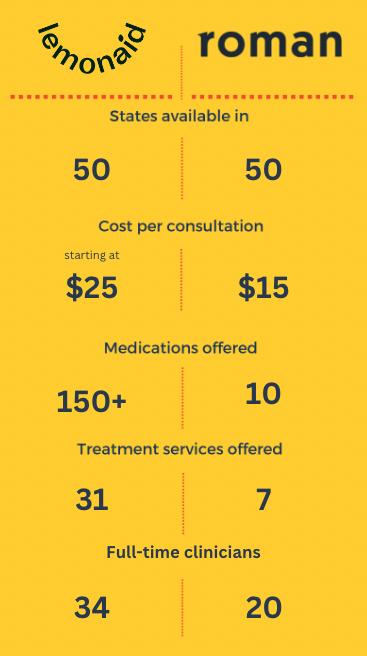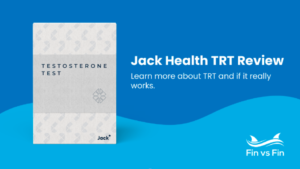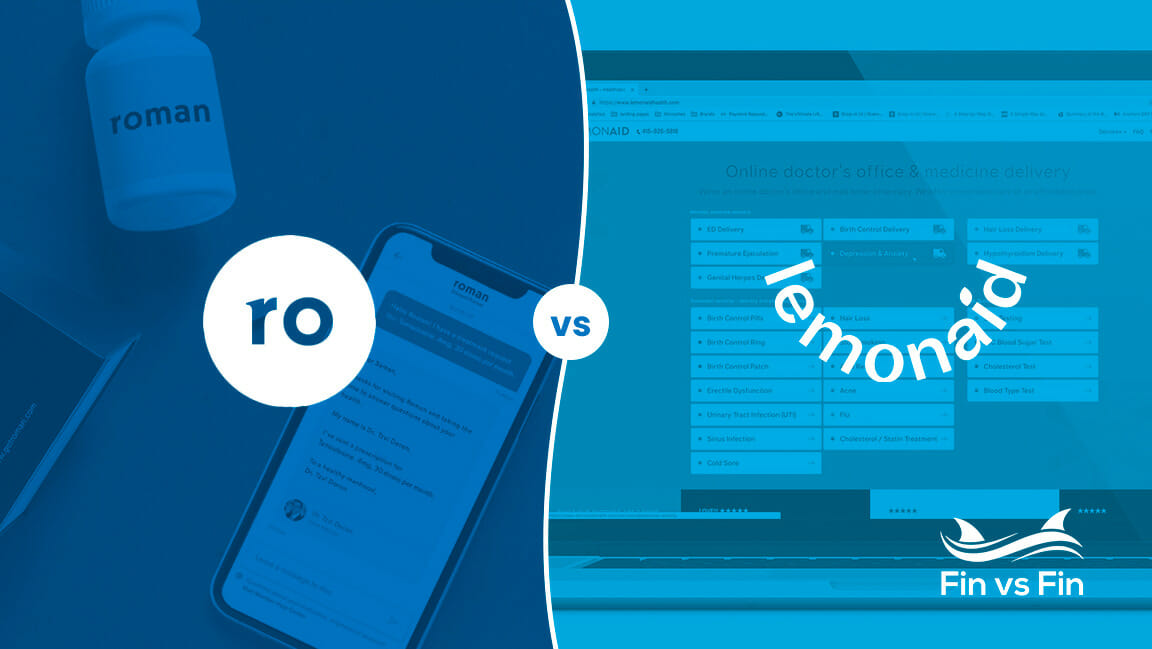Doctor in a pocket. Telemedicine. Doctor on demand. Whichever way you wish to frame it – this new model for digital healthcare is absolutely teeming with potential and growing fast.
There has long been a stigma for men dealing with sensitive and somewhat embarrassing health struggles. Society tells us that males aren’t supposed to have issues like erectile dysfunction, premature ejaculation, and hair loss, but millions everywhere do, and they should never feel ashamed or relegated to suffer in silence.
The beauty of on-demand telehealth apps like Roman and Lemonaid is that they tackle these issues head-on. They offer men the help they need – when they need it most – by making it easier and more discrete to acquire prescription medications online.
On-demand healthcare is heating up
If you’re like most Americans, seeing a physician is a painful occurrence that’s minimized to once a year at most. Between the time it takes to drive, park, fill out forms, wait for the doctor, and ask the awkward, albeit necessary questions, it all adds up to a thoroughly draining experience. Of course, there’s also typically a hefty co-pay, and that’s merely step 1. The pharmacy and all its tedium awaits you patiently.
Innovative direct-to-consumer companies like Roman Health and Lemonaid were built to disrupt the monotony. They’ve focused on making healthcare as convenient as ordering an Uber, handling everything from diagnosis to medicine delivery. By and large, they are successfully giving dudes the luxury of treating some of their most embarrassing symptoms from the comfort (and privacy) of home.
While both Lemonaid and Roman cater to the modern man’s desire for expediency, convenience, value, and discretion, what exactly sets the two online pharmacies apart? Buckle up as we unpack their core differences and compare them head to head — Lemonaid vs Roman — including a full analysis of the medications they provide and the symptoms they treat.
Lemonaid Health: An Overview of the Platform
Photo source: Lemonaid
First, let’s take a look at Lemonaid, who calls themselves an “online doctor’s office.” Their mission-driven telehealth platform makes it easy to get affordable care, whether you have insurance or are one of the millions of Americans who don’t.
With 34 clinicians based in the US, consultations start at $25 for Lemonaid patients. That’s likely less than your current co-pay to see a doctor and works just as well as a means of acquiring a year’s supply of medication that the physician recommends. The consultation occurs via chat message, phone, or video conference within two hours after a patient submits an online form.
The company facilitates the intake of medical history and condition-specific questions as well as a doctor’s review and writing of an Rx script (which Lemonaid sends electronically to your pharmacy of choice within two hours.)
What kind of medicine does Lemonaid prescribe online?
The list is long and ever-evolving (over 150 medications and 31 services now offered), but here’s a short list of the conditions Lemonaid offers prescription meds for:
- erectile dysfunction
- depression
- anxiety
- premature ejaculation
- birth control
- hair loss
- smoking cessation
- cholesterol management
- the flu and sinus infections
- urinary tract infections
Lemonaid operates in all 50 states, though some service-specific restrictions vary by state.
Roman Health: An overview of the leading digital health clinic for men
Photo Source: Roman
In contrast to Lemonaid’s long menu of prescription drugs, Roman focuses much more narrowly on the most common men’s health issues, providing convenient treatment for:
It’s platform to diagnose and treat these medical conditions is currently licensed to dispense pharmaceuticals in 49 out of 50 states. An online consultation with a doctor on Roman’s team takes about 5 minutes and is 100% free.
Yep, you read that right: it’s 100% free to get an online doctor’s visit via Roman. You only have to pay for the cost of treatments or medications, which get mailed in custom, discrete packages.
As a loyal customer, I can tell you that Roman makes it exceedingly easy to consult with a doctor virtually and get prescribed medication for a handful of the most common health issues plaguing men. We go deeper into this provider in our article “is Roman legit?” You can also read about some of the differences between Roman, Hims and Keeps, all players in the hair loss medicine space.
How does Roman’s telemedicine platform work, exactly?
Patients simply submit a photo and an ID, as well as a medication preference, if they have one. Patients can download the company’s app, fill out the medical history as part of the comprehensive online visit, complete a questionnaire and speak with a physician if they choose.
A physician that is licensed in the patient’s state of residence will determine whether a prescription is appropriate. If approved, the medication is shipped to the patient’s home within two days.
Photo Source: Roman
Roman offers a handful of prescription drugs as part of their “cloud pharmacy.” That includes sildenafil — both generic and branded (Viagra) — as well as Cialis and Levitra, for erectile dysfunction. Prices range from $2 to $63 per pill. Other common medications they prescribe are finasteride (for hair loss), Valacyclovir (for herpes), Sertraline (for premature ejaculation), and bupropion (for smoking cessation).
Those prescriptions may also be sent to any pharmacy, but at Roman’s own, you can get your packages delivered in a plain brown box, with doses portioned into single-serve packets for wallet- and pocket-friendliness.
Lemonaid vs Roman: What's similar?
The drive for convenience, fast service, and price transparency is the standard that is now being set at both Roman and Lemonaid. And while both cutting-edge, VC-backed companies come equipped with fashionable packaging and effective social media-driven marketing campaigns – there are other key similarities between the two companies.
While theoretically, it could be cheaper to shop on sketchy sites for prescription drugs, Roman and Lemonaid are leaders in the new class of legitimate online pharmacies that give you access to real doctors via the web. If you’re used to buying drugs on the dark web, you may have to pay a bit more, but for everyone else, Roman and Lemonaid’s drug prices are extremely affordable, especially given the convenience factor that comes with gaining access to a personalized consultation with a physician.
Both companies supply their own network of pharmacy partners, or will directly send patients to current pharmacies for pickup. They both respond with follow-ups to their questions and concerns with timeliness and carefulness.
And while both Lemonaid and Roman Health employ similar practice models, they both have to navigate the thorny healthcare regulations in each state — many of which were written years ago and might not comply with their current business and operating model.
Part of that means having their doctors go through extended background checks and license verification processes with the local medical board to determine how they fit into working with this new and evolving telemedicine framework. For this reason, both companies are extremely buttoned-up when it comes to regulatory standards for care.
Lemonaid vs Roman: What are the key differences?

So which online pharmacy is better: Roman or Lemonaid? Roman is focused exclusively on lower-risk but extremely common conditions like hair loss and erectile dysfunction for men, while Lemonaid lacks a clear focus and provides medicines for a much wider range of patients (including women!)
Lemonaid currently offers 31 treatment services for things like mental health conditions, urinary tract infections (UTIs), cold sores, flu, acute sinusitis, and acne, as well as treatment to quit smoking, get tested and treated for sexually transmitted diseases (STDs) like chlamydia, and screening for high cholesterol and diabetes.
They are both available in all 50 states, so the biggest difference, in my opinion, is that Lemonaid charges $25 for a consultation, no matter what condition is assessed, compared to Roman’s free virtual doctor visit.
What are the risks associated with telemedicine from Roman or Lemonaid?
There are current limitations on telehealth services in different states. Changing clinical guidelines can impact this landscape as well as the difficulty in locating prescribers who wish to engage in this type of service.
While the digital healthcare space is booming and making things a whole lot more convenient for patients, it is important to argue both sides of the discussion to understand all angles. With the rise of digital level of practice, there is the potential downside for misdiagnosis or abuse of antibiotics. And because there isn’t the continuity factor with having the same family health doctor, there is the worry that about fragmented or unnecessary care.
And when you are focused objectively on an area so heavily rooted in men’s health, like erectile dysfunction, it could lead to larger heart diseases.
As noted by Dr. Steven Lamm, the director of the Tisch Center for Men’s Health at N.Y.U. Langone, and a medical adviser to Roman, “erectile dysfunction is often a barometer of a man’s health, [and] there is a potential for it really to be a reflection of vascular disease. You want to be certain you have the right screening procedures to rule out the person who is inappropriate to be put on this.”
There is also the level of difficulty towards expanding into states with smaller populations with unfriendly telemedicine regulations. Because these companies are located in the tech-rich area of San Francisco and some states are long distances away from the Pacific Time Zone, there’s concern that patients won’t always have access to the company’s doctors who work during standard business hours.
Roman especially, but Lemonaid to a great degree as well, offer fantastic customer support and make it easy to consult with a doctor on the patient’s schedule, regardless of where they live. That said, neither service is intended to be used for urgent care.
Why telemedicine is transforming healthcare
Whether you’re for it or not, telemedicine is impacting healthcare. COVID may have accelerated the trend, but connecting with licensed medical professionals via video conference will long outlast the global pandemic.
The word ‘disruption’ gets thrown around far too carelessly in the ‘move fast and break things’ world of modern tech, and you have to be careful when it comes to healthcare. But innovative companies like Roman Health and Lemonaid are truly disrupting the delivery of a subset of prescription medications.
Luckily for men, this subset is one that covers a lot of embarrassing cases that you likely want to take care of without an awkward conversation with your doctor face to face. And the list of telehealth services you can get is practically growing by the day.
Lemonaid vs Roman: So which do we recommend?
In general, we are bullish on online telemedicine providers versus the traditional in-person doctor + pharmacy visit because of how much time and money you end up saving.
Lemonaid has done a fantastic job of replicating the old-school, one-stop-shop pharmacy model online by offering a comprehensive, end-to-end marketplace that covers drugs for more than just men’s health.
That said, if you’re a man suffering from PE, ED, Hair loss, cold sores, or nicotine addiction, we actually recommend Roman. That’s because you’ll end up paying less (i.e. FREE virtual doctor visits) and get more specialized care.
Speaking of paying less, we have a newsletter that covers all the latest offerings. Subscribe below to stay in the loop:
Who should use Roman as their cloud pharmacy?
Roman is rapidly on their way to becoming a household name in the area of sensitive men’s health. You may have seen their ads during the MLB playoffs (they are an official sponsor) or following you all over facebook / instagram. Either way, the company’s popularity has grown immensely over the last few years, and for good reason.
In our experience, they offer the best patient experience, at the best price for erectile dysfunction, premature ejaculation, hair loss, and herpes. If you’re a man looking to treat one of these conditions, we highly recommend you set up a free doctor’s visit with Roman to see their diagnosis and what medications they prescribe for your symptoms.
And who should use Lemonaid instead of Roman?
Simply put, everyone else. If you’re female or want to get more than just hair loss / penis pills, then Lemonaid is a better call. While they boast a wide range of services, Lemonaid is especially innovative in the treatment of mental health — an area that sorely needs attention. Given that Roman offers nothing for anxiety or depression, Lemonaid shines bright in this category.
In fact, Lemonaid was the first on-demand depression and anxiety online treatment service nationally. They recognized that only 10% of primary care clinics accepted new patients and were able to offer a same-day appointment for depression and anxiety.
With a flat, all-in fee of $95/hour, patients can get unlimited video, message or telephone interaction with a doctor, as well as get medicines prescribed and shipped directly from the Lemonaid pharmacy.
If you’re looking for performance anxiety meds (i.e. something to calm you down before a big speech or presentation), you should also check out Hims and Kick Health.
The Verdict: Roman vs Lemonaid, which one do we recommend?
Roman offers much more specific treatments and medications, while Lemonaid has over 150 medications and 31 services offered by 34+ clinicians nationwide. So, while Lemonaid has an incredible breadth of prescription offerings, it is a much less focused approach than Roman. Thus, Lemonaid might be spread a bit too thin by offering way more areas of attention instead of focusing on just a core few.
Thus, as we mentioned before, we recommend Roman for men looking for prescription hair loss, ED, or PE treatments. For all other meds, especially mental health Rx for conditions like anxiety and depression, Lemonaid is ideal.
Having a technologically-enabled solution empowers men to take ownership and complete control over their total health. By leveraging evidence-based guidelines and the most up-to-date clinical protocols to provide quality care, both companies are the gold standard of what healthcare is evolving into – and forcing us all to rethink the way healthcare works.
If you’ve used either telemedicine (or others we didn’t mention), we’d appreciate hearing about your experience in the comments below.
Discover more telemedicine reviews

Wisp BV Reviews – Is It Worth It for Bacterial Vaginosis & Other Infections?
Wisp Bacterial Vaginosis Treatment Overview Cost: $9 to about $33 per month Rx medications: Metronidazole tablets/gel, clindamycin tablets/cream OTC remedies: Boric acid suppositories, probiotics Potential

Wisp Herpes Review 2024 – Does It Work for Oral and Genital Sores?
Wisp Herpes Treatment Overview Cost: $9 to $35 per month Treatments for: Cold sores and genital herpes, episodic or suppressive therapy Rx medications: Valacyclovir and

Henry Meds Semaglutide Review – Is It Legit for Weight Loss?
Henry Meds GLP-1 Weight Management Overview Cost: $297 per month (including medication) What’s prescribed: Compounded semaglutide Administration method: Injections Potential side effects: Nausea, constipation, diarrhea

Jack Health TRT Review – Does TRT Really Work?
Jack Health TRT Overview Price: $90 every 3 months for blood work and consultation Products offered: Taro-testosterone gel, vitamins, add-on blood tests Symptoms targeted: Mood changes, low sex

Numan Hair Loss Review: How It Works, Treatment Cost, Benefits, and More
Numan Hair Loss Overview Price: About £15 to £40 Products offered: Minoxidil foam and spray, Regaine, finasteride pills, triple action spray (finasteride, minoxidil, azelaic acid),

LloydsPharmacy Online Doctor Review – Is It the Best Online Doctor in the UK?
LloydsPharmacy Online Doctor is a UK-based telemedicine platform that provides consultations and treatments for many medical conditions and concerns, including asthma, migraines, allergies, hair loss,


















